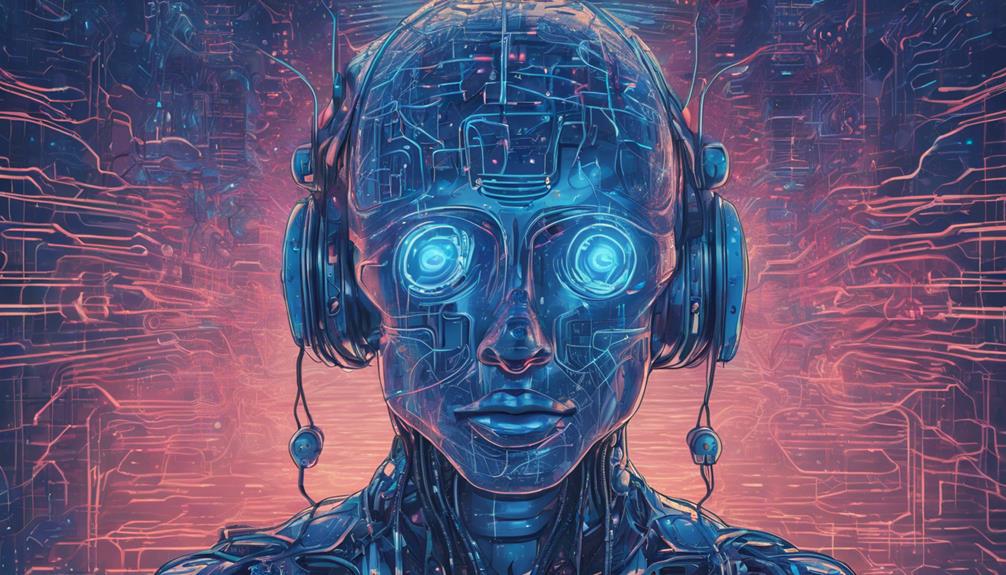Artificial intelligence has traversed a profound journey from its conceptual beginnings to a tangible, influential presence that seamlessly integrates into daily life, enhancing various aspects of modern existence. From virtual assistants like Siri and Alexa to navigation apps optimizing route suggestions, AI has transformed industries like healthcare and finance. Pioneering figures like Alan Turing, Marvin Minsky, and Frank Rosenblatt laid the groundwork for AI's rapid evolution. As AI continues to shape modern society, its impact is undeniable. As we explore the milestones and key contributors that have led to AI's widespread adoption, we reveal the profound impact of this technological revolution.
Key Takeaways
• Artificial intelligence has transformed from conceptual beginnings to a tangible, influential presence in daily life, enhancing various aspects of modern existence.
• Milestones in AI's evolution, including the Dartmouth Summer Research Project and the Turing Test, have collectively contributed to its transformation.
• Key contributors like Alan Turing, Marvin Minsky, and Frank Rosenblatt have played an essential role in shaping AI's development and practical applications.
• AI has a profound impact on modern life, from virtual assistants to healthcare diagnostics, with machine learning and deep learning algorithms in widespread use.
• AI is reshaping traditional industries, injecting efficiency, and tapping into new revenue streams, with applications in healthcare, finance, automotive, and entertainment.
AI's Journey to Everyday Life
In addition, artificial intelligence transcended from conceptual beginnings to a tangible, influential presence. It seamlessly integrated into daily life, enhancing various aspects of modern existence. AI's influence is evident in virtual assistants, like Siri and Alexa, which have become an integral part of our daily routines.
Additionally, AI-powered navigation apps on smartphones optimize route suggestions, making our commutes more efficient. The technology has also transformed the healthcare industry, enabling accurate diagnostic imaging and autonomous medical procedures. AI's ability to learn from data and adapt to new situations has made it an indispensable tool in various industries, revolutionizing the way we live and work.
Its pervasive presence has elevated modern living, making it an essential component of our daily lives.
Milestones in AI's Evolution

The journey of artificial intelligence has been marked by significant milestones, which have not only shaped its development but also paved the way for its widespread adoption in various industries and aspects of modern life.
One notable milestone was the Dartmouth Summer Research Project on Artificial Intelligence, which coined the term 'Artificial Intelligence' in 1956.
The 1951 Turing Test, proposed by Alan Turing, also played a pivotal role in shaping AI's evolution.
The 1980s saw the rise of expert systems, while the 1990s and 2000s witnessed significant advancements in machine learning and deep learning.
These milestones have collectively contributed to AI's transformation from a theoretical concept to a tangible, influential presence in modern society.
Key Contributors to AI

Pioneering figures like Alan Turing, Marvin Minsky, and Frank Rosenblatt laid the groundwork for AI's rapid evolution, driving innovation and breakthroughs that continue to shape the field. Their contributions have been pivotal in shaping the trajectory of AI research.
Alan Turing's Turing Test, for instance, challenged the distinction between human and machine intelligence, sparking a new wave of research.
Marvin Minsky's work on neural networks and Frank Rosenblatt's development of the perceptron, a type of feedforward neural network, further propelled AI's growth.
These key contributors, along with others, have played an essential role in shaping AI's development, paving the way for its widespread adoption and practical applications.
AI's Practical Impact Today

Building upon the foundation laid by key contributors, artificial intelligence has evolved to exert a profound impact on various aspects of modern life, transforming industries and revolutionizing the way we live and work. Today, AI is an integral part of our daily lives, from virtual assistants to healthcare diagnostics. Its practical applications are vast and diverse, with machine learning and deep learning algorithms being utilized in various sectors.
AI-powered chatbots provide 24/7 customer support, enhancing customer experience and reducing operational costs.
AI-driven analytics in finance enable accurate predictions and fraud detection, streamlining operations and minimizing risks.
AI-assisted medical imaging and diagnostics improve healthcare outcomes, allowing for early detection and treatment of diseases.
Transforming Industries With AI

Across various sectors, artificial intelligence is reshaping traditional industries, injecting unprecedented efficiency, and tapping into new revenue streams. AI-infused systems are streamlining operations, reducing costs, and enhancing customer experiences.
In healthcare, AI-powered diagnosis tools are improving accuracy and speed, while in finance, machine learning algorithms are detecting fraud and predicting market trends. The automotive industry is leveraging AI for autonomous vehicles, and the entertainment sector is using AI-driven recommendations to personalize user experiences.
Frequently Asked Questions
Can AI Systems Truly Be Creative or Just Mimic Human Creativity?
Can AI systems truly be creative or just mimic human creativity?
The answer lies in understanding the nuances of artificial intelligence.
While AI can generate novel combinations of existing ideas, it lacks the original thought and emotional depth inherent in human creativity.
AI's 'creativity' is rooted in complex algorithms and pattern recognition, allowing it to mimic human-like outputs, but not truly create.
This distinction highlights the boundaries of AI's capabilities, underscoring the unique value of human imagination and innovation.
How Do AI Algorithms Handle Biases in Training Data and Human Decision-Making?
AI algorithms can handle biases in training data and human decision-making through various techniques. One approach is data curation, where datasets are carefully selected and balanced to minimize bias.
Another method is regularization, which adds penalties to the algorithm's loss function to discourage biased predictions.
Additionally, human oversight and auditing can help identify and correct biases.
Moreover, techniques like adversarial training and ensemble methods can improve algorithmic robustness against biased data.
What Are the Potential Consequences of Creating Autonomous AI Systems?
The development of autonomous AI systems raises concerns about potential consequences, including unintended actions, loss of human oversight, and potential biases.
Autonomous systems may perpetuate existing biases or create new ones, leading to unfair outcomes. Additionally, the absence of human intervention may exacerbate errors, compromising safety and reliability.
It is important to develop safeguards and regulations to mitigate these risks and promote responsible development of autonomous AI systems.
Can AI Be Used to Enhance Human Intelligence or Just Augment It?
The question of whether AI can enhance human intelligence or merely augment it is a pressing concern.
Consider the example of a skilled chess player, who, with AI-assisted analysis, can refine their strategy and improve their gameplay. Here, AI enhances human intelligence by enhancing it with data-driven insights.
This synergy demonstrates AI's potential to not only augment but also enhance human intelligence, opening up new possibilities for human-AI collaboration.
Will AI Eventually Surpass Human Intelligence, and What Are the Implications?
The importance of AI surpassing human intelligence is a topic of ongoing debate. While AI has made tremendous progress, it is still uncertain whether it will ultimately surpass human intelligence.
If AI does surpass human intelligence, implications could include significant advancements in fields like medicine and space exploration, but also potential job displacement and ethical concerns.
It is vital to continue monitoring AI's development and considering its potential consequences.
Conclusion
To sum up, Artificial Intelligence has undergone a remarkable transformation from conceptual beginnings to pervasive applications, revolutionizing modern society.
A striking statistic: AI-powered chatbots are projected to handle 80% of customer service interactions by 2025, exemplifying AI's profound impact on industries and daily life.
As AI continues to evolve, its transformative potential will reshape the future, necessitating ongoing exploration and refinement to harness its full potential.










